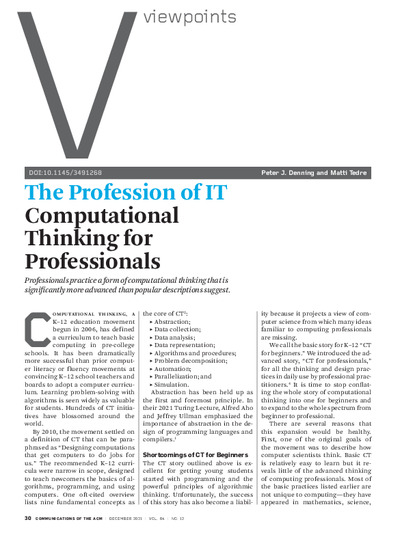Computational Thinking for ProfessionalsErstpublikation in: Communications of the ACM, December 2021, Vol. 64 No. 12, Pages 30-33
Publikationsdatum:
|
 |
 Diese Seite wurde seit 1 Jahr inhaltlich nicht mehr aktualisiert.
Unter Umständen ist sie nicht mehr aktuell.
Diese Seite wurde seit 1 Jahr inhaltlich nicht mehr aktualisiert.
Unter Umständen ist sie nicht mehr aktuell.
 Zusammenfassungen
Zusammenfassungen
 Professionals practice a form of computational thinking that is
significantly more advanced than popular descriptions suggest.
Professionals practice a form of computational thinking that is
significantly more advanced than popular descriptions suggest. Die beiden Autoren argumentieren, dass "computational thinking" meist für Anfängerinnen und Anfänger definiert wird und sich diese Kompetenzen deutlich von denjenigen unterscheiden, über die professionelle Informatikerinnen und Informatiker verfügen müssen.
Die beiden Autoren argumentieren, dass "computational thinking" meist für Anfängerinnen und Anfänger definiert wird und sich diese Kompetenzen deutlich von denjenigen unterscheiden, über die professionelle Informatikerinnen und Informatiker verfügen müssen. The CT story outlined above is excellent for getting young students started with programming and the powerful principles of algorithmic thinking. Unfortunately, the success of this story has also become a liability because it projects a view of computer science from which many ideas familiar to computing professionals are missing.
The CT story outlined above is excellent for getting young students started with programming and the powerful principles of algorithmic thinking. Unfortunately, the success of this story has also become a liability because it projects a view of computer science from which many ideas familiar to computing professionals are missing.We call the basic story for K–12 "CT for beginners." We introduced the advanced story, "CT for professionals," for all the thinking and design practices in daily use by professional practitioners. It is time to stop conflating the whole story of computational thinking into one for beginners and to expand to the whole spectrum from beginner to professional.
 Despite more than a half-century of research on how to teach computing in the school, teaching computing concepts to children remains a great challenge. It will keep computing education researchers busy for decades to come. We advocate that CT curriculum developers focus their attention to two things.
Despite more than a half-century of research on how to teach computing in the school, teaching computing concepts to children remains a great challenge. It will keep computing education researchers busy for decades to come. We advocate that CT curriculum developers focus their attention to two things.- First, we advocate that teachers use computing's hard-earned hours in the K–12 curriculum to teach practices unique to our discipline, instead of rehashing generic brain puzzles, mathematics exercises, or perceptual reasoning problems. We are concerned that in the excited rush to develop CT curricula for schools, too many generic ideas may have been introduced at the cost of computing's own disciplinary concepts, ideas, skills, and practices. This ought to be changed.
- Second, we advocate that the public face of CT be expanded to cover the rich spectrum of CT insights from beginner to professional. One of computing's perennial challenges has been the public perception of the field as little more than coding. This image of computing is harmful because it does not show the public the vast range of activities people in computing do. We curate and clean data, train neural networks, and use them to make everyday things smart. We find ways to avoid network bottlenecks to get the full power of the world's biggest computing clusters to the fingertips of smartphone users, without them ever noticing any delay. We continuously seek clever heuristic ways to circumvent the limits of computing. We build software that creates virtual worlds that seamlessly fit social communities and their practices.
 Dieser wissenschaftliche Zeitschriftenartikel erwähnt ...
Dieser wissenschaftliche Zeitschriftenartikel erwähnt ...
 Dieser wissenschaftliche Zeitschriftenartikel erwähnt vermutlich nicht ...
Dieser wissenschaftliche Zeitschriftenartikel erwähnt vermutlich nicht ... 
 Tagcloud
Tagcloud
 Zitationsgraph (Beta-Test mit vis.js)
Zitationsgraph (Beta-Test mit vis.js)
 1 Erwähnungen
1 Erwähnungen 
- WiPSCE '22 - The 17th Workshop in Primary and Secondary Computing Education, Morschach, Switzerland, 31 October 2022 - 2 November 2022 (Mareen Grillenberger, Marc Berges) (2022)

- 1. Computational Thinking 2.0 (Matti Tedre) (2022)


- 1. Computational Thinking 2.0 (Matti Tedre) (2022)
 Volltext dieses Dokuments
Volltext dieses Dokuments
 |  Computational Thinking for Professionals: Artikel als Volltext ( Computational Thinking for Professionals: Artikel als Volltext ( : :  , 2222 kByte; , 2222 kByte;  : :  ) ) |
 Anderswo suchen
Anderswo suchen 
 Beat und dieser wissenschaftliche Zeitschriftenartikel
Beat und dieser wissenschaftliche Zeitschriftenartikel
Beat hat Dieser wissenschaftliche Zeitschriftenartikel während seiner Zeit am Institut für Medien und Schule (IMS) ins Biblionetz aufgenommen. Beat besitzt kein physisches, aber ein digitales Exemplar. Eine digitale Version ist auf dem Internet verfügbar (s.o.). Es gibt bisher nur wenige Objekte im Biblionetz, die dieses Werk zitieren.









 Algorithmus
Algorithmus Computer
Computer design thinking
design thinking facebook
facebook Google
Google Neuronales Netz
Neuronales Netz Biblionetz-History
Biblionetz-History